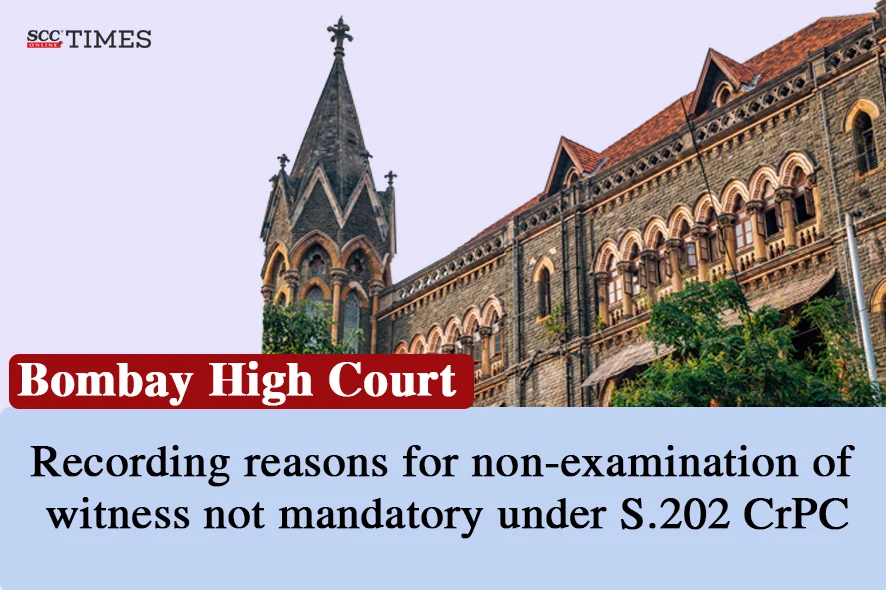Bombay High Court: In the present case, the Magistrate passed an order issuance of process under Section 202 of the Criminal Procedure Code, 1973 (‘CrPC’) as the petitioner’s cheque was dishonoured on the ground of ‘account closed’. The Single Judge Bench of Urmila Joshi-Phalke, J., held that it was not mandatory to record the reasons for non-examination of witnesses on affidavit while exercising power under Section 202 of CrPC. Hence, verification of the complaint was sufficient for compliance of Section 202 of CrPC and not conducting inquiry would not vitiate the issuance of process. Therefore, no interference was required in the order passed by the Magistrate.
Background
The petitioner was an incorporated company under the Companies Act, 2013, while the respondent was the original complainant. The petitioner had purchased pulses, edible oil and other goods prior to year 2002 for an amount of Rs. 35,26,102 from a registered partnership firm based in Akola, which was payable as on 31-3-2002. It was agreed between the petitioner and the said firm that the petitioner shall pay interest on the outstanding amount at the rate of 12%. On 6-4-2021, the firm transferred the debt which was due from the petitioner to the respondent. This transfer of debt was effected by a registered instrument. As per this agreement, the respondent had agreed to pay an amount of Rs. 70,00,000 to the firm on or before 31-12-2021. Therefore, it was agreed that the respondent shall be entitled to receive, recover and retain the amount from petitioner.
Thereafter, the complainant contacted the petitioner for the recovery of the amount. After negotiations, the petitioner finally issued a cheque of Rs. 75,00,000 to the respondent. When the cheque was presented by the respondent in the bank, the cheque got dishonoured stating the reason as “Account Closed”. Thus, the respondent served a demand notice within stipulated time, but the petitioner failed to make the payment within the statutory period.
Aggrieved by the same, the respondent filed a complaint before the Magistrate, who passed an order for issuance of process. The petitioner filed a revision application against the order of the Magistrate which got dismissed. Hence, the petitioner approached the present Court for setting aside the order of Magistrate and for quashing of the criminal proceedings against it.
The petitioner contended that it did not transact any business before 2002 with the respondent or with his predecessor, as alleged in the complaint and stated that the said complaint was filed with mala fide intention to harass and extract money from the petitioner. It was also contended that since the Magistrate did not give reasons for not conducting the inquiry under Section 202 of CrPC, the order was liable to be quashed.
Analysis, Law and Decision
Referring to the case Expeditious Trial of Cases Under Section 138 of NI Act, 1881, In re, (2021) 16 SCC 116, wherein the Supreme Court clarified that Section 202(2) of CrPC was inapplicable to complaints under Section 138 in respect of examination of witnesses on oath, the Court observed that the ground of challenging the said order for not holding inquiry under Section 202 of CrPC was unsustainable. Furthermore, it was opined by the Court that the examination or verification of complaint was sufficient compliance of Section 202 of CrPC.
The Court, after referring to the petitioner’s contention that the said order should be quashing on another ground that the debt could not be recovered as it was time barred, pointed out that Section 25(3) of the Contract Act, 1872 (ICA) provided a crucial exception to the Limitation Act, 1963 which bars the recovery of debt after a particular time period. The Court stated that Section 25 of ICA validated a written and signed promise to pay a time barred debt. Thus, the issuance of cheque in the instant case fulfilled the requirement of the said section therefore, the said debt could not be called time-barred. Additionally, it was stated that the original transaction, even if time barred, served as valid past consideration for the new promise to pay represented by the cheque.
Accordingly, the Court held that since Section 25(3) of ICA was an exception to the Limitation Act, 1963, thus, debt was not time-barred and also held that it was not mandatory to record the reasons for not examining the witnesses on affidavit while exercising power under Section 202 of CrPC, therefore, no interference was required in the order passed by the Magistrate.
[Pancham International Ltd. v. Shevam, 2025 SCC OnLine Bom 2967, decided on: 20-8-2025]
Advocates who appeared in this case:
Advocate for the Petitioners- A.S. Mardikar, Senior Counsel; Rohan Chandurkar, Benny Joseph, Advocates
Advocate for the Respondents- M.G. Sarda, Borwankar, Advocates



